Nirjala Ekadashi falls on June 18, 2024. It is one of the most important and austere fasting days in the Hindu calendar. This day is dedicated to Lord Vishnu. It is observed with great devotion by:
- The Vaishnav Community
- Hindus Worldwide.
You should explore the Hindu Online Puja Services to gain a new perspective on Hindu tradition, mythology, and customs. This article delves into why Nirjala Ekadashi stands out from the other Ekadashis.
Important lessons learned
Nirjala Ekadashi is the most stringent of all Ekadashis. This requires:
- Complete fasting without water
- representing the pinnacle of discipline and devotion.
The day is spiritually elevating because it is associated with the story of Bhima. He wanted to observe all Ekadashis without fasting due to his voracious appetite. This resulted in the creation of Nirjala Ekadashi. Nirjala Ekadashi is observed through various rituals, including:
- The Nirjala Ekadashi Vrata
- Chanting Prayers
- Bhajans
- Performing acts of charity and philanthropy.
The Ekadashi is especially important in the Vaishnav community, with organizations such as ISKCON actively encouraging its observance, which includes regional variations. Aside from spiritual benefits, Nirjala Ekadashi is thought to have health benefits such as:
- Physical detoxification
- Mental
- Emotional purification.
You can also find Hawan & Yagna Services online, or perform another ritual to bring new perspective and significance to your life.
Nirjala Ekadashi Significance
Due to its stringent fasting rules, Nirjala Ekadashi is considered the strictest of the Ekadashis. Devotees fast from all food and water for 24 hours.
- It begins with the sunrise on Ekadashi
- Ends with the sunrise the following day.
This fast is observed without drinking any water. The name ‘Nirjala’ means ‘without water’. The discipline required for Nirjala Ekadashi is rigorous. It is believed that following this fast will provide enormous benefits.
| Day Before Ekadashi | Ekadashi Day | Day After Ekadashi |
| No evening meal | Full Fasting | Breakfast after sunrise |
The fast is a test of self-control and devotion, with spiritual benefits said to be equivalent to those of all other Ekadashis combined. However, the fast is difficult. It also allows for deep spiritual reflection and connection with the divine. Devotees pray, meditate, and read holy scriptures to stay focused. Further, reap the full spiritual benefits of this auspicious occasion.
Nirjala Ekadashi Rituals
The Nirjala Ekadashi Vrata
The Nirjala Ekadashi Vrata is celebrated with great devotion. It is considered the most austere and sacred of all Ekadashi fasts. The essence of the Nirjala Ekadashi Vrata is its ability to purify the soul and bring one closer to moksha, or liberation from the cycle of birth and death. The following list outlines the main practices during Nirjala Ekadashi:
- Complete abstaining from food and liquids
- Recitation of Vishnu Sahasranama.
- Lord Vishnu is worshipped via meditation and prayer.
- Read or listen to the story of Nirjala Ekadashi.
- Avoidance of rice and all grains.
Prayers and Bhajans
On Nirjala Ekadashi, devotees step up their spiritual practices, which include singing prayers and bhajans. These devotional songs express love and respect for Lord Vishnu.
- Morning Rituals: Devotees frequently begin their day with a prayer session during the Brahma Muhurta. It is considered the most auspicious period.
- Community Gatherings: Many people gather in temples to sing bhajans. It creates a communal spiritual environment.
- Personal Worship: People recite mantras and sing bhajans in private, emphasizing their connection to the divine.
This Ekadashi differs from the at least 24 others that occur each year in that it has strict fasting rules and is believed to yield the combined merits of all other Ekadashis. It is a day of:
- Reflection
- Devotion
- Mantra chanting
This offers a unique opportunity for:
- Spiritual growth
- The attainment of peace
- Salvation.
Finally, Book online Hindu puja services at an online temple for your Puja ritual, proper chanting mantras, and divine blessing.
Also Read: Ekadasi Rules: What to do and what not to do

